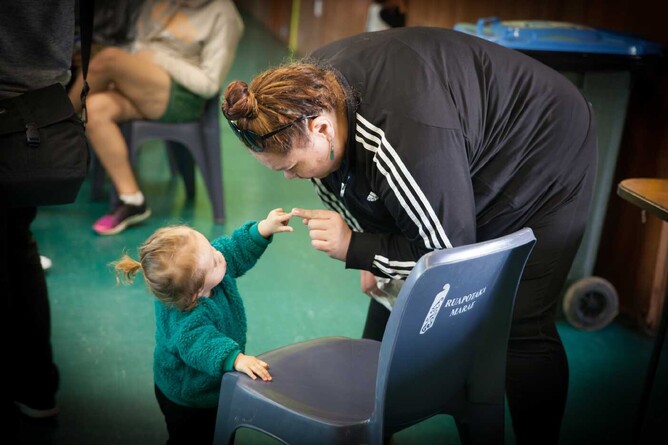Emma Quigan, Community Action Lead for Talking Matters
The term ‘whānau-centred practice’ was a favourite of mine when I worked as an early intervention Speech-Language Therapist.
It slipped off the tongue with such ease and became part of the furniture. It was comfortable and familiar. The thing with familiar pieces of furniture is that you can stop noticing them. They’re just there. After moving from a traditional speech-language therapy role to become a Community Activator at Talking Matters, I listened to some of our SLT catchphrases with new ears. What do we actually mean by ‘whānau-centred’?
In my new job, I was tasked with supporting the Tāmaki community to find unique ways to promote interactive talk with pēpi/babies in their first 1,000 days. Being the ‘whānau-centred’ practitioner that I was, I had many ideas about what needed to happen to make this initiative a success. I’d been a Hanen certified facilitator for years, I could work with that knowledge but make it better. Firstly, I needed to place whānau at the centre… Aue! Who is placing who where? What does that actually mean in practice? I didn’t realise at the time how much I had to learn.
I was fortunate to be working with some incredible women from the Glen Innes Family Centre who wore many hats; whānau, mother, community worker. Through a process of whanaungatanga, I entered into trusting relationships with my new colleagues. My assumptions were challenged continuously. The skills and expertise I brought were valued but were not the only source of knowledge at the table.
Our ideas turned into something resembling a parenting programme, and Talking Matters to Tāmaki (TMTT) was born. It involves whānau to whānau coaching, group learning sessions (whānau-led) and informal get-togethers. I noticed a level of ‘buy-in’ that I rarely saw in traditional SLT spaces. People asked for homework! Participants wanted to know when they could become a coach. Whānau coaching is a dynamic and promising approach in our field. What could happen if whānau were supported to coach each other, and the professional’s role was decentred? TMTT was heading in this direction, and I wanted to understand what was happening.
With my colleagues’ encouragement, I decided to embark on a master’s degree and study TMTT for my thesis. I utilised kaupapa Māori methods and explored how an SLT can work in partnership with a community organisation. My research draws on the narratives of programme designers (whānau-coaches), participating whānau and me, as we reflected on a process that spanned more than two years.
My research set out to disrupt the status quo of parent education and illuminate new and different ways of seeing. Results demonstrate a pathway to move from thinking about language learning as the transmission of skills and knowledge to making space for whānau to recentre Indigenous linguistic and cultural practices.
The following two research questions guided the study.
• How might a parenting programme act as a catalyst for whānau transformation and cultural and linguistic reclamation?
• How can our shared journeys provide insights about valued knowledge sources and practices for whānau?
I used these questions to make sense of the coaches’ and parents’ narratives in designing and implementing TMTT. The thesis begins to fill gaps in knowledge of what whānau see as valuable in parenting programmes.
Macfarlane, Macfarlane and Gillon’s He Awa Whiria/The Braided Rivers (2015) provided a framework for thinking about my research. The model is dynamic and allows for different cultural knowledge systems to function separately or together, just as the streams of a braided river flow apart or together on their journey to the sea.
He Awa Whiria aims to shift thinking away from a ‘one-stream’ paradigm, where dominant mainstream knowledge is considered universal. The approach does not exclude other cultures or worldviews. Rather, it provides a platform for them to be woven into any programme or system.
My findings make a case for an adaptation of the He Awa Whiria/ Braided Rivers. Raising children is not a theoretical exercise; it is deeply personal. A parenting programme can be the catalyst for whānau transformation when it offers participants an entry point to connect with their language and culture. Seeing their language and culture validated and celebrated was a mana-enhancing experience for whānau. It triggered an interest in learning more about Mātauranga Māori and Western science and filtering the knowledge through their lived experiences. Instead of integrating Western and Indigenous knowledge systems, the whānau coaches used Western science as a tool for realising the abundance of their Indigenous knowledge systems. They are in the process of reclaiming, re-visioning and re-centering. I added whānau knowledge and pedagogies to He Awa Whiria as an additional knowledge stream. Representing the lived experiences and knowledge that whānau bring to the kaupapa elevates and values their expertise.
The whānau-to-whānau coaching model is a unique approach underpinned by Māori values. Coaches assert and promote rangatiratanga/self-determination through supporting whānau to set their own goals. Coaching is not one-directional, as the coach learns as much from whānau as they share. The Māori value of akoranga/reciprocal learning and teaching describes the coaches’ style of learning. The coaches’ mentoring system is one of tuakana-teina/relationships. Through drawing on this value, TMTT creates an environment for a movement to flourish. Whānau are not only taking part in a programme; they are tuakana in training.
Many of us utter without thinking that “it takes a village to raise a child.” If we really mean that, we must decentre ourselves as professionals.
Special thanks and sincere gratitude to the co-researchers of this study. Without you, there would be no TMTT and no thesis. Shan, Sam, Char, Ari, Samantha and Tracy.
This article originally appeared in the magazine of the NZ Speech Therapy Association, Communication Matters Issue 42, Autumn 2021. Reused with permission.
Emma’s thesis is available from the University of Auckland library (to current students). If you’d like to know more, please get in touch with Emma via Talking Matters


